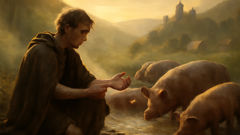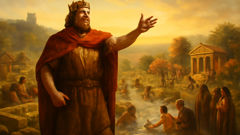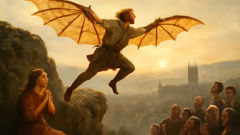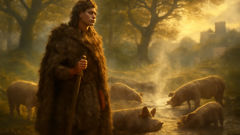Introduction
Long before the steaming baths and honeyed stones drew crowds to Somerset’s valleys, before Rome’s legions and medieval pilgrims left their marks, the land was wild—a tapestry of misty hills and ancient oaks, where spirits whispered on the breeze and legends grew among the stones. It was here, between the rolling Mendip hills and the winding River Avon, that Bladud was born to the lineage of kings who called Britain their own. His story is stitched into the very earth: a tale of exile, healing, invention, and an ambition that soared too high. The legend of Bladud is not merely the story of a king but a chronicle of human striving—how the longing to heal, to learn, and to fly has shaped lives and cities. From his earliest days in his father’s court, Bladud stood apart, curious and restless, his mind not content with the old tales and customs. He questioned the priests, learned from traveling scholars, and wandered among the people. But fate is rarely gentle with those who dream too widely. When a mysterious plague struck, Bladud found himself cast out, cursed by illness and suspicion. Yet, in the shadow of despair, the young prince’s journey began—leading him through the lonely woods of Britain, into the company of pigs and outcasts, toward the bubbling hot springs that would one day birth a city. Bladud’s legend is woven with healing magic and the mysteries of nature, but at its core lies a deeply human story. He learned wisdom from hardship, found hope where others saw only ruin, and dared to imagine the impossible. The city of Bath, with its healing waters, stands as his testament—but so too does the memory of his final flight, when invention and ambition lifted him toward the sky. This is the story of Bladud: exile and founder, healer and dreamer, whose footsteps echo still among the stones of Bath.
Exile and Discovery: Bladud Among Beasts and Spirits
Bladud’s childhood was filled with the rhythms of a royal court—feasts beneath timbered roofs, lessons in the old tongue, and a father’s stern gaze. Yet, beneath the gilded veneer, young Bladud sensed that the world was vaster than the stories sung by bards. He often wandered beyond the palisades, trading tales with traders, watching the river’s dance, and learning the subtle language of the land. His curiosity set him apart—admired by some, mistrusted by others.

When illness crept through the kingdom, its arrival was as silent as fog rolling over the hills. First, a cough here, a fever there—then swelling red sores, breathless nights, a sense of doom. The court’s healers whispered of curses and omens, but no remedy stemmed the tide. Even the prince could not escape. When the telltale rash appeared on Bladud’s skin, dread rippled through the court. The queen wept; the king’s eyes grew cold. By the laws of their ancestors, Bladud was to be exiled—sent beyond the borders so his plague would not doom the bloodline or the people.
Alone, shamed, and weak, Bladud left his home behind. His only companions were memories and a herd of pigs entrusted to his care by a kindly swineherd who pitied the fallen prince. He wandered the wilds, living as an outcast. His days blurred into a pattern of hunger, cold, and aching joints. The pigs, sturdy and clever, became his solace. They foraged for roots, wallowed in mud, and snuffled through brambles. Bladud learned to read their moods, finding comfort in their earthy presence.
One bitter dawn, deep in the valley where the Avon ran slow and silent, Bladud noticed something strange. The pigs he tended—many afflicted with skin sores and mange—tumbled eagerly into a patch of steaming mud beside a rocky spring. The water shimmered, hot even in the grip of winter. Day after day, the pigs returned to the spring. Gradually, their sores faded, coats thickened, and vitality returned. Intrigued, Bladud followed their example. Cautiously, he stepped into the warm water. The heat seeped into his bones, easing pain he’d carried for months. He let the mud coat his skin, breathing in mineral vapors.
As days passed, Bladud felt strength return. The sores that had driven him from his father’s court shrank and vanished. In time, even his spirit healed. Was it magic? Or was there something in the earth—a secret the ancients had forgotten? He watched dawns break across the valley, the mists curling like silent witnesses to his rebirth. Bladud gave thanks to the land, the spirits, and the clever pigs who had led him to healing. The hot springs were a gift not just for him but for all who suffered. But what would he do with this knowledge? His journey back to the world had only begun.
A City Rises: The Healing Waters and the Wisdom of Bladud
Restored by the hot springs, Bladud returned to the world as a changed man. He did not go first to the royal court but instead traveled among outcasts, healers, and wise women scattered across the hills. He shared the secret of the healing waters with lepers, laborers, and travelers, earning a reputation as a bringer of hope. Where once he had been shunned, now people gathered at his fires to hear of the valley where illness could be shed like an old skin. Tales spread quickly; soon the valley was thronged with the desperate and the curious.

Years passed. The king, having lost all hope of his son’s return, grew frail. His kingdom, too, suffered from strife and division. When news reached him that a healer in the west was working wonders, he summoned Bladud—though he scarcely dared believe the rumors were true. The meeting was tense: Bladud’s scars had faded but not his memories. Yet, with gentle words and wisdom hard-won by exile, Bladud won back his father’s trust. The court marveled at his transformation. When the king died, Bladud took the throne not as a conqueror but as one who had known suffering.
As king, Bladud honored both the old ways and new learning. He founded a settlement at the springs, building wooden huts and a sanctuary where all—regardless of rank or affliction—could bathe and heal. Under his guidance, the settlement grew. He invited scholars and craftspeople from distant lands, seeking wisdom from Phoenicia, Gaul, and even Greece. Bladud dreamed of a city unlike any in Britain, a place where knowledge and mercy would be as abundant as the steaming waters.
Bath’s fame spread far beyond the valley. Pilgrims and merchants journeyed there, bringing new customs and ideas. Bladud oversaw the carving of stone channels to direct the hot water, the raising of shrines to honor Sulis, goddess of healing, and the planting of orchards on the hills. The air was always scented with woodsmoke, apple blossoms, and mineral steam. People whispered that Bladud could speak to spirits and that he was favored by the gods. In truth, he simply listened—to the land, to the outcast, and to the wisdom hidden in unlikely places.
Bladud’s rule was marked by peace and prosperity, but he remained restless. The city he built was a wonder, but he still yearned for deeper truths. If water could heal, what else might be possible? He turned his mind to the mysteries of the world: the flight of birds, the movement of stars, the power locked in earth and wind. The land that once exiled him now offered its secrets freely—but every gift carried its own dangers.
Dreams of Flight: The Invention That Challenged Fate
Years turned Bladud’s hair silver but could not dull his hunger for discovery. His city thrived; healing flowed as freely as water. Yet every morning, as mists lifted over the Avon, Bladud watched the birds—crows wheeling above rooftops, gulls soaring along river currents. Their effortless mastery of air haunted him. Why should humans, with their clever hands and restless minds, be earthbound? Had not suffering taught him that boundaries could be crossed?

Bladud’s obsession grew. He scoured ancient scrolls brought by traders, questioned every foreign guest about myths of flight. He observed birds, sketching their wings and noting the way air curled beneath feathers. Secretly, in a chamber above the springs, he built models from willow and cloth. Each failure was met not with despair but with patient adjustment. Some courtiers mocked his experiments as folly; others whispered that the king dabbled in magic best left alone. But Bladud pressed on.
His greatest supporter was his daughter, Sabrina—a quick-witted girl with her father’s curiosity and courage. Together, they tested frames and gliders on the city’s windy hills. The first attempts were disasters: wings snapped, cloth tore, and Bladud landed in mud more than once. Still, Sabrina cheered him on, patching bruises and helping tweak designs. For each failure, they learned—about balance, lift, and the resilience of hope.
Finally, after years of trial and error, Bladud stood atop a high cliff overlooking Bath. He wore a harness of leather and willow, its wide wings covered in fine linen. The city below shimmered in early morning light. A crowd gathered—courtiers anxious, townsfolk awed, Sabrina steadfast at his side. Bladud gave a short speech: ‘Let us not fear what we do not understand. As water can heal, so may air bear us aloft. All wisdom comes from daring to dream.’
He leapt. For a breathless moment, he soared—wings catching a current, body suspended between earth and sky. The valley spun beneath him, dazzling and vast. But fate is fickle. A gust caught the frame; the wings shuddered. With a cry, Bladud plunged, crashing among the stones. The city rushed to his side. Sabrina knelt, holding his hand as life ebbed away. Bladud’s final words were a whisper: ‘Tell them—let none be afraid to dream.’
Bath mourned its king with sorrow and pride. They built a monument where he fell and placed his broken wings within the sanctuary. Sabrina ruled wisely after him, honoring his legacy of healing and hope. For generations, people came to bathe in the springs and gaze up at the hills—wondering if, one day, they too might learn to fly.
Conclusion
Bladud’s legend endures not only in the stones and waters of Bath but in the deeper currents of human longing—for healing, for knowledge, for transcendence. His exile taught him humility; his discovery brought hope to many. As king, he nurtured a city where suffering was not hidden but met with compassion and curiosity. And though his final flight ended in tragedy, it was also an act of faith: that even in failure, dreams have the power to lift us above our burdens. The bubbling springs of Bath still welcome travelers seeking comfort. Pilgrims whisper their thanks to Bladud, healer and founder. Above all, his story invites each generation to seek wisdom in unexpected places—and to remember that every great leap begins with a single brave step.













